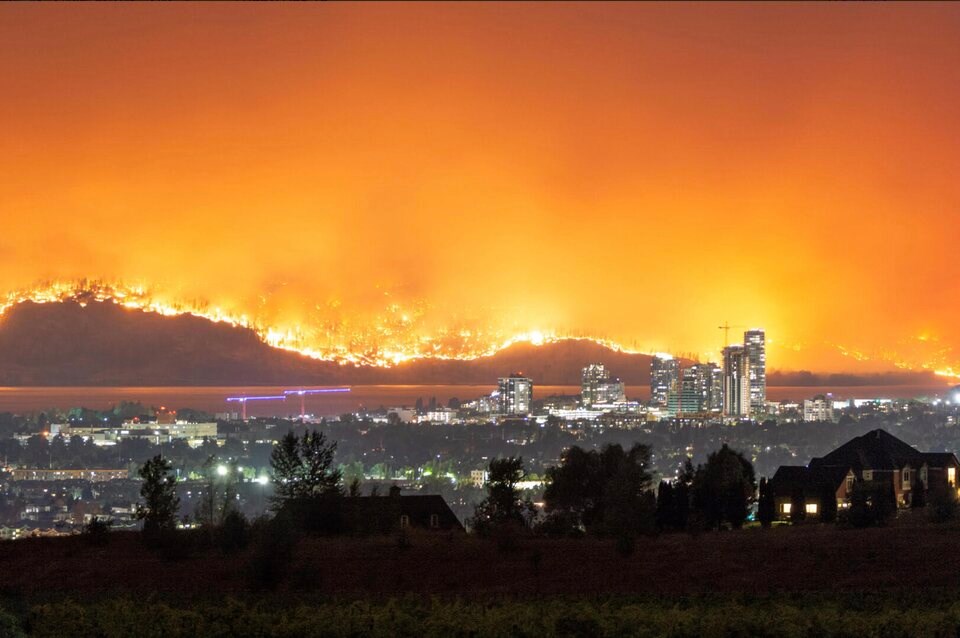When raging wildfires crested the hills above West Kelowna, a small army of healthcare workers began an evacuation of seniors unlike anything British Columbia has ever seen.
A convoy of wheelchairs, stretchers, beds, buses, trucks and shuttles convened on eight care homes in Kelowna and West Kelowna, where more than 900 seniors were carefully whisked away to Metro Vancouver over 48 hours.
It was a herculean logistical challenge. Not only did health officials have to shepherd extremely vulnerable and frail elderly patients from their rooms to waiting transportation and safety, but they also had to coordinate care plans and medication for each one, notify relatives and ensure everyone had food, water and medical supervision for an almost four-hour trip to the Lower Mainland.
“It’s a lot for sure,” Interior Health CEO Susan Brown said in an interview Sunday. “But things have gone relatively smoothly to date considering the situation.”
The care homes were a mix of public and private, with a variety of patients ranging from long-term elderly suffering cognitive impairment like dementia, to assisted-living clients with walkers and wheelchairs, independent living seniors who have their own apartments and brain-injured seniors who need intensive help and oversight.
Interior Health’s emergency command centre marshalled trucks to pick up specialized medical equipment separately. Seniors confined to beds were matched with whatever public or private ambulance services were available.
Health officials rounded up city buses, shuttles and whatever they could find. Four different buses departed Saturday alone, arriving in Vancouver at 10:30 p.m. and as late as 1 a.m. Sunday.
Interior Health tried to match available staff with the seniors, said Brown, to ensure the buses had the right mix of care aides, licensed practical nurses (LPNs) and registered nurses where needed.
“Our staff are rockstars — they are dependable, reliable and resilient when it comes to this type of thing,” said Brown.
“It’s sad to say, but we are getting better in this space because we’ve done it before. And we’re really trying to minimize the impact on those we serve.”
In 2021, Interior Health had to evacuate almost 800 seniors from Kelowna, Merritt, Armstrong, 100 Mile House, Lillooet and elsewhere, amidst wildfires. At that time, airports were open and some of the most vulnerable could be medivaced to Vancouver. This time, Kelowna General Airport’s airspace was closed to maximize the availability of water bombers and helicopters.
Health officials walked a delicate balance to get the seniors out of their homes as fires closed in around them, while at the same time trying to keep anxiety, confusion and stress at the disruption from being overwhelming.
“This would be definitely stressful to some of that population so that’s why, to the best of our ability, we work with Wildfire Services B.C. and Health Emergency Management B.C. to try and forecast what’s coming,” said Brown.
“Nobody has a crystal ball. We need to make decisions before maybe there’s an order or alert. These populations take awhile to get ready. The last thing you want to do is get people out in a pressured way.”
On board the buses, staff packed water and meals for the trip. The buses weren’t equipped with washrooms, which meant frequent stops for the elderly to use facilities. But it would not have been safe to have the seniors trying to use small washrooms on the bus while it was navigating the route to Vancouver, anyway, because of the high potential for a fall or injury, said Brown.
Near the care homes, the community also rallied to help. Hotels reached out to offer rooms, which Interior Health has catalogued in case they need to evacuate other care homes, said Brown.
“Today we had the Sikh temple in Kelowna reach out with transportation offerings,” she said. “Our MLAs are assisting in any way they can. There’s been so much support from areas, it’s unsolicited and we’re grateful for their kindness.”
Interior Health sent a clinical nurse specialist ahead of the buses to work with Vancouver officials to receive the seniors and coordinate medications.
Some seniors were taken to spaces in existing care homes, but the bulk have been housed in a vacant former care home that has been reactivated by health officials for the evacuees, said Brown.
“They are going into a space appropriate for seniors care, where they will get beds comfortable to sleep in and an environment appropriate for seniors,” she said.
“Things like evacuation centres are just not set up for seniors, being on cots and down low and those things.”
It’s not clear how long the evacuated seniors will need to stay in the Lower Mainland. “The last thing we want to do is create that yo-yo effect where we put people back and they have to re-evacuate,” said Brown. “So we will wait until that situation stabilizes.”
Brown said Interior Health did its best to notify families of the evacuated seniors, but some relatives are on holiday at this time of the summer.
A call centre for those unsure of the location of their relatives is operating at 1-833-469-9800.
Rob Shaw has spent more than 15 years covering B.C. politics, now reporting for CHEK News and writing for Glacier Media. He is the co-author of the national bestselling book A Matter of Confidence, host of the weekly podcast Political Capital, and a regular guest on CBC Radio. [email protected]


